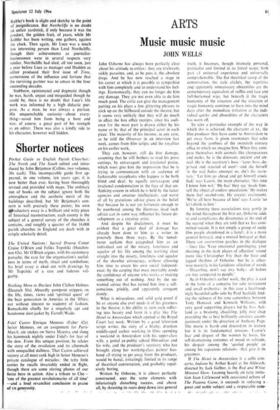Luce living
GEORGE HUTCHINSON
At four, Henry Robinson Luce, child of American missionaries in China, was com- posing sermons. This infant aptitude was a pointer to what lay ahead. He became a journ- alist, one of the most successful that the world has known—but he was always a preacher. Through his long career as co-founder and head of the Time, Life and Fortune magazine empire, God, America, the Republican party and the defeat of communism were his com- pulsive causes. 'All Washington is sad,' said_ President Johnson when Luce died at sixty- nine. 'He was one of the greats.'
Certainly he! waA ,a brilliant practitioner in the kind., of 'assembly line' group journalism which he invented' in 1923 with his first part- ner, Briton Hadden (who died very young). But, as Mr kobler demonstrates, facts and reality were often studiously distorted in Time to suit editorial policy and personal prejudice. Luce might defend this from the depths of his own (and perhaps well-founded) convictions. But he was supposed, after all, to be publish- ing news. And news is what it is, whether you like it or not.
Distortion or suppression apart, I have often thought that very few British journalists of any consequence could stomach—or would stand for—the sort of 'editing' to which the corres- pondents of the American news magazines are subjected week by week, their articles and re- ports' forever being transformed into something quite unlike the, original. It can't be altogeffie4 satisfying for the writers.
Compared with such a classic of newspaper biography as Reginald Pound's and GeOffrey Harmsworth's superb life of Northcliffe, Mr Kohler's book is slight and sketchy to the point of, insignificance. But Northcliffe is no doubt an unfair yardstick, if only because-it was the product, the golden fruit, of years, while Mr Kohler has been writing, one gathers, against the clock. Then again, Mr Luce was a much less interesting person than Lord Northcliffe, though their achievements as journalist- businessmen were in several respects very similar. Northcliffe had died, all too soon, just a year before Luce as manager and Hadden as editor produced their first issue of Time, cornerstone of the influence and fortune that the surviving partner was to amass in the four succeeding decades.
Stubborn, opinionated and dogmatic though he was, harsh, unjust and misguided though he could be, there is no doubt that Luce's life work was informed by a high didactic pur- pose. As a man, he was always a puritan. His unquenchable curiosity—about every- thing—saved him from being a bore and was, of course, a great part of his strength as an editor. There was also a kindly side to his character, however well hidden.







































 Previous page
Previous page